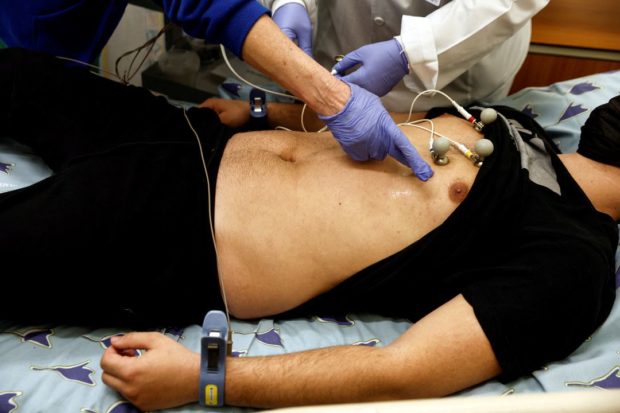Almost a third of people lingering symptoms 6-12 months after COVID-19–study

A patient suffering from Long COVID is examined in the post-coronavirus disease (COVID-19) clinic of Ichilov Hospital in Tel Aviv, Israel, February 21, 2022. REUTERS
Almost a third of people report at least one ongoing symptom between 6 and 12 months after their coronavirus infection, a survey of 152,000 people in Denmark has found.
The study includes one of the largest groups yet of people who were not hospitalised with COVID, and followed them for longer than other major studies, the researchers from Denmark’s State Serum Institute (SSI) said.
The questionnaire-based study suggested that the most commonly reported long-term symptoms were changes in sense of smell and taste, as well as fatigue.
Conducted between September 2020 and April 2021, well before the recent Omicron variant surge, the survey compared the responses of 61,002 people who had tested positive for the coronavirus six, nine or 12 months before with those of 91,878 people who had tested negative.
In total, 29.6% of the respondents who had tested positive reported at least one ongoing physical symptom 6 to 12 months after infection, compared to 13% in the control group.
Article continues after this advertisementJust over half (53.1%) of those with positive tests said they had experienced either mental or physical exhaustion, sleep problems or cognitive problems within the 6 to 12 months after infection. That compared to 11.5% in the control group.
Article continues after this advertisementNew diagnoses of anxiety and depression were also more common among those with a history of SARS-CoV-2 infection, the study showed.
The study was published as a pre-print and has not yet been peer reviewed.
Study author Anders Peter Hviid, an epidemiology professor at SSI, said the results are another sign that the long tail of COVID-19 should be considered by policy makers.
“It’s something you should take into account when you are weighing up the risks and benefits of… the interventions you are making, and vaccinations,” he said in a phone interview, stressing that more studies are needed.
Estimates on the prevalence of what is known as long COVID vary. The World Health Organization (WHO) calls the syndrome Post-COVID-19 condition and defines it as ongoing symptoms – including fatigue or shortness of breath, among others – three months after the initial infection that last at least two months.
The WHO estimates that between 10% and 20% of people are affected by that point and says more work is needed on the longer-term prognosis.
David Strain, lecturer at the University of Exeter Medical School in the UK who was not involved in the study, called the report “really concerning.”
“If Omicron is causing long Covid at the same rate as these earlier variants, we could be looking at a major crisis over the next 12 months given the number of people who have been exposed to this virus,” he said.
RELATED STORIES
Long haul COVID-19 patients find hope in recovery clinics
‘Long COVID’ possible in 10- 15% of infected persons — DOH
‘Long COVID’ from Omicron coronavirus variant possible, say experts
‘Long COVID’ may affect multiple parts of body and mind, doctors say
For more news about the novel coronavirus click here.
What you need to know about Coronavirus.
For more information on COVID-19, call the DOH Hotline: (02) 86517800 local 1149/1150.
The Inquirer Foundation supports our healthcare frontliners and is still accepting cash donations to be deposited at Banco de Oro (BDO) current account #007960018860 or donate through PayMaya using this link.